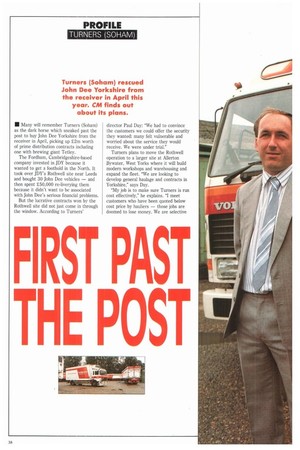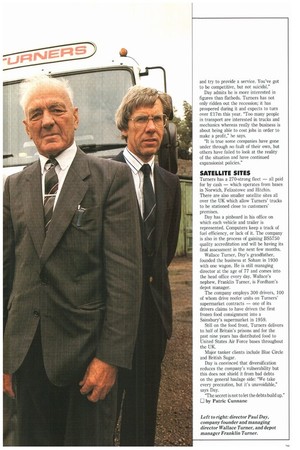FIRST PAST THE POST
Page 40

Page 41

If you've noticed an error in this article please click here to report it so we can fix it.
Turners (Soham) rescued John Dee Yorkshire from the receiver in April this year. CM finds out about its plans.
• Many will remember Turners (Soham) as the dark horse which sneaked past the post to buy John Dee Yorkshire from the receiver in April, picking up £2m worth of prime distribution contracts including one with brewing giant Tetley.
The Fordham, Cambridgeshire-based company invested in JDY because it wanted to get a foothold in the North. It took over JDY's Rothwell site near Leeds and bought 30 John Dee vehicles — and then spent £50,000 re-liverying them because it didn't want to be associated with John Dee's serious financial problems.
But the lucrative contracts won by the Rothwell site did not just come in through the window. According to Turners' director Paul Day: We had to convince the customers we could offer the security they wanted: many felt vulnerable and worried about the service they would receive. We were under trial."
Turners plans to move the Rothwell operation to a larger site at Allerton Bywater, West Yorks where it will build modern workshops and warehousing and expand the fleet. "We are looking to develop general haulage and contracts in Yorkshire," says Day.
"My job is to make sure Turners is run cost effectively," he explains. "I meet customers who have been quoted below cost price by hauliers — those jobs are doomed to lose money. We are selective and try to provide a service. You've got to be competitive, but not suicidal."
Day admits he is more interested in figures than flatbeds. Turners has not only ridden out the recession; it has prospered during it and expects to turn over £.17m this year. "Too many people in transport are interested in trucks and mechanics whereas really the business is about being able to cost jobs in order to make a profit," he says.
"It is true some companies have gone under through no fault of their own, but others have failed to look at the reality of the situation and have continued expansionist policies."
SATELLITE SITES
Turners has a 270-strong fleet — all paid for by cash — which operates from bases in Norwich, Felixstowe and Hitchin. There are also smaller satellite sites all over the UK which allow Turners' trucks to be stationed close to customers' premises.
Day has a pinboard in his office on which each vehicle and trailer is represented. Computers keep a track of fuel efficiency, or lack of it. The company is also in the process of gaining BS5750 quality accreditation and will be having its final assessment in the next few months.
Wallace Turner, Day's grandfather, founded the business at Soham in 1930 with one wagon. He is still managing director at the age of 77 and comes into the head office every day. Wallace's nephew, Franklin Turner, is Fordham's depot manager.
The company employs 300 drivers, 100 of whom drive reefer units on Turners' supermarket contracts — one of its drivers claims to have driven the first frozen food consignment into a Sainsbury's supermarket in 1959.
Still on the food front, Turners delivers to half of Britain's prisons and for the past nine years has distributed food to United States Air Force bases throughout the UK.
Major tanker clients include Blue Circle and British Sugar.
Day is convinced that diversification reduces the company's vulnerability but this does not shield it from bad debts on the general haulage side: "We take every precaution, but it's unavoidable," says Day.
"The secret is not to let the debts build up." ILI by Patric Cunnane Left to right: director Paul Day, company founder and managing director Wallace Turner, and depot manager Franklin Turner.
























































































